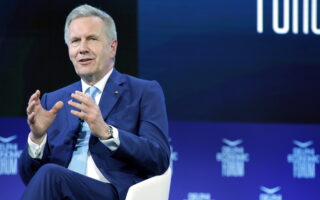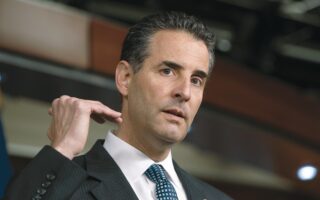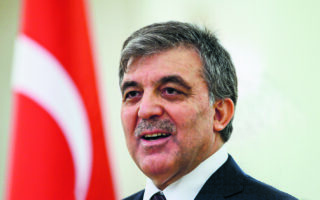Joint solution on migration needed
New German Ambassador in Athens says Berlin seeks stronger Europe

Berlin appreciates Greece’s efforts to contain migrant flows into the European Union but it is also hoping to discuss ways of reducing secondary migration to Germany, the country’s new ambassador to Greece, Andreas Kindl, tells Kathimerini in his first interview from his new post in Athens.
He also notes that Germany wants changes to the way the EU makes decisions related to foreign policy and civil defense so that they can be passed with an enhanced majority rather than requiring unanimous support.
Greek Prime Minister Kyriakos Mitsotakis held talks with German Chancellor Olaf Scholz in Berlin just a few days ago. Does the positive atmosphere of that meeting reflect a shift in the mood of Greek-German relations today?
Greek-German relations stretch a long way back and they are close, complicated and multifaceted. Prime Minister Mitsotakis’ recent visit was a particularly positive confirmation of our good relations. I am very pleased to begin my term in Athens in such an auspicious atmosphere and I will do everything in my power to further enhance bilateral ties. We are on the same page when it comes to many issues, especially inside the EU but also in other international fora, and we act together. The fact that we agree on constructive discussions on major matters like climate change, immigration, EU reform and the further evolution of the international order is very encouraging.
The Covid pandemic, but mainly the wars in Ukraine and more recently in the Middle East, are much different challenges to those we have experienced in the recent past. How important are these challenges for Germany?
‘There are states, like Russia, that have benefited greatly from a reliable and rules-based international order, without, however, having any respect whatsoever for these rules’
The pandemic showed us all how dependent we are on supply chains, but also how vulnerable these supply chains are. The Russian attack on Ukraine further demonstrated that there are still states, like Russia, that have benefited greatly from a reliable and rules-based international order, without, however, having any respect whatsoever for these rules. China also challenges this order, and this is compelling us, in the EU, to adopt measures aimed at improving the resilience of our economies. Russia’s aggression towards Ukraine and the conflict sparked by the especially barbaric attack by the Hamas terrorist group against Israel in the Middle East are further exacerbated by aggressive communications, by fake news, whose aim is to destabilize our democracies. This is another challenge we have to deal with.
Could these crises also serve as an opportunity for bolder steps toward closer cooperation within the European Union on matters of security, defense and even foreign policy?
We need to evolve the EU if we want to prepare for the future and to shield it more effectively against present-day and future challenges. What German policy for Europe wants to accomplish is to enhance the EU’s capacity for action, its cohesion and resilience, through, for example, more decisions being taken with support from an enhanced majority [rather than unanimously], particularly in the areas of common foreign policy and civil defense, but also by strengthening its economic and technological position, which can be achieved by, among other measures, diversifying the scope of economic cooperation. Germany’s desire for EU enlargement is a geopolitical imperative, but also a geopolitical opportunity, if it comes with succinct reforms that enhance our ability to act.
Greece, as a country of first entry, and Germany, as one of the key destinations for migrants and refugees, have a tough nut to crack when it comes to immigration. Given that Dublin II is basically inactive and the EU-Turkey joint statement needs to be renewed, what are the next steps that need to be taken?
The management of refugee and migrant inflows is another one of the great challenges of this era. It is imperative, therefore, that we reach some fair and sustainable compromises among us, within the EU, that will contribute to an overall improvement of the situation. This is something both Greece – as one of the main reception countries on the EU’s external borders – and Germany – as one of the main destination countries – want.
Following the lull during the pandemic, there has been a marked rise in arrivals again this year, both in Greece and in Germany, but more especially so in the case of the Greek islands of the Aegean, where the summer months saw a significant increase in arrivals by sea. This is a very big burden on Greece and Germany deeply appreciates the Greek side’s efforts, which are ultimately carried out on behalf of the EU. For us, though, it is also very important for there to be an exchange of views on how we can reduce secondary migration to Germany. This is a matter that requires joint solutions. As for the 2016 EU-Turkey statement which you mentioned, we believe it is essential for Turkey to start upholding the commitments stemming from the agreement more effectively. In order to achieve this, we want to work together with Greece and other EU member-states.
For the first time, Greece and Germany have broached the subject, at the bilateral level, of connecting their energy markets – and electrical energy in particular – from south to north. Are there any real prospects for such a project?
As a heavily industrialized and populous country, Germany is not in a position to cover all of its energy needs on its own. This is why we rely on energy imports. Russia’s war of aggression on Ukraine made it clear that we cannot rely on single countries or suppliers for these energy imports, so the key now is diversification and we are naturally looking at southern Europe and beyond. And Greece really does occupy a leading position as a potential hub for green energy from the Eastern Mediterranean, as Prime Minister Mitsotakis noted during his visit to Berlin.





